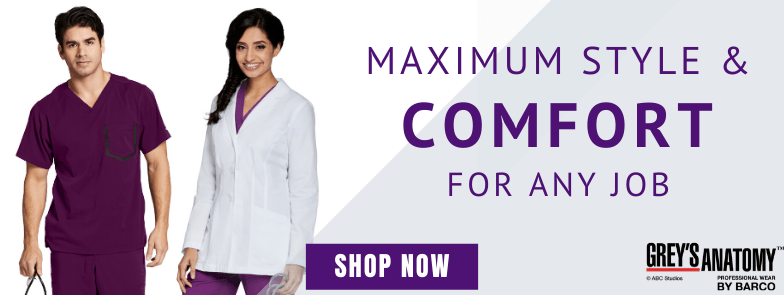Importance of Comfort for Everyday Heroes
Everyday heroes are all around us, from hospital staff, to teachers, to parents – but when it comes to medical professionals, we must examine the topic of self-care and stress management.
A rudimentary search for terms related to professional medical care and comfort will highlight the fact that most research done around comfort in the medical field has prioritized patient comfort – and for good reason. The medical field exists to make patient’s lives better, and the role that comfort plays in improving outcomes and making speedy recovery possible is absolutely undeniable.
But there is something to be said for doctors, nurses, and the everyday heroes who get up in the morning, dress for work, and spend a considerable portion of the next 24 hours putting their minds and bodies through a high level of stress in order to preserve and improve the health of others.
The Physical and Mental Stress of Being Everyday Heroes
More than just granting them a rudimentary upgrade in feeling, comfort is something critical for the professionals who often put their lives and longevity on the line to treat and care for patients. A comfortable nurse will be able to work more effectively, dodge the high burnout rate, and avoid injury.
A comfortable doctor will be able to focus on their patient’s health even better and avoid nagging pains of their own. A physician’s or nurse’s job isn’t easy, but the right gear and comfortable attire can spell the difference between distracting, nagging, and draining pains, and a healthier approach to work.
It Starts with the Shoes
Shoes are some of the most important things a doctor or nurse can wear. This is because good posture and spinal health begins in the soles, heels, and ankles, and our feet are evolved to navigate, walk, and run on a variety of surfaces, most of which have a lot of give and a little variance. But because most hospitals consist of hard, uniform floors, improper or ill-fitting foot attire can quickly lead to:
- Bruised and injured feet and ankles
- Poor arches
- Pain in the knees and hips
- Bad posture
- Injuries further up the body
Poorly fitting or non-supportive shoes can also impede a professional’s speed and mobility and affect how well they can care for their patients. If a person has poor arches to begin with, then shoes that lack the means to address this issue will only help further exacerbate it. It’s no secret that nurses, doctors, and medical technicians have a very physically demanding job, and being properly equipped to do that job is critical.
Despite that, few nurses, and doctors address this by opting for optimal footwear. Clogs are a good step in the right direction, offering a comfortable and wide toe box as well as good heel support. Yet there are other options on the market specifically addressing the needs of nurses and doctors, as well as many lightweight shoes that effectively do the same thing without being marketed specifically to medical professionals.
These may include shoes designed for running and tennis (both of which are designed to cushion impact, avoid skidding through special patterning, and provide larger toe boxes for improved stability). Just be sure to opt for shoes that resist spills or cover them in non-skid scrub booties.

Quality Scrubs and Performance
Shoes provide a strong foundation, but they’re far from the only source of physical comfort needed on the job. Good quality scrubs are essential for all types of everyday medical heroes a variety of reasons:
- Comfortable and efficient designs allow for greater mobility and flexibility in a job that requires one to be on their toes, and physically active.
- Moisture-wicking and odor-repellant fabric helps expel sweat and avoid offensive odors over the course of a very long and arduous shift.
- Scrubs are easily washed and don’t stain quickly and are often antimicrobial to help avoid the spread of contaminants throughout the hospital.
Good quality scrubs and professional wear can address many of the physical needs that nurses, doctors, and technicians face on a daily basis. Ill-fitting, poorly made scrubs don’t clean up well, wear out much faster, are worse for the environment, don’t feel great to move around in, are not sufficiently breathable, and are more likely to cause the transfer of infectious material through spills.
Not only do high-quality scrubs feel good, but they’re important to improving patient health. That, and they can even have a mental impact on your patients.
Comfortable but Professional
Research has shown that scrubs with an appropriately sized white lab coat invoke nearly the most trustworthiness among doctors and nurses, second only to formal attire with a white lab coat (which is particularly popular among older patients).
While formal attire might invoke the greatest amount of professionalism and trust, it is a poor choice for the physical requirements of the job – scrubs offer the best possible compromise, signifying the profession and essentially acting as a uniform and source of authority and trust, while providing the best parameters to move around and be efficient.
Self-Care for Medical Professionals
This entire post is ultimately meant to reflect on a crucial topic that many everyday heroes such as medical professionals are not addressing effectively – the topic of self-care and stress management. It simply isn’t enough to kick back with a drink of choice and a quick film after a long day at work and call that self-care.
Nor is it fine to just think of stress as a drain, and your mind and body as a battery – one that you deplete over the course of work and replenish whenever you have a few days free. Self-care and stress management principles and techniques need to be put into practice on a daily basis. They’re as critical as making rounds, looking after patients, and preparing for surgery.
This is because the only way to be truly productive, efficient, and functioning as a physician or a nurse is to be fit and healthy, both physically and mentally. While we cannot expect professionals in a stressful environment to be at 100 percent every day of the week, medical professionals should make their own health a priority – especially if they’re running a practice, as the health and care of their patients may very well rely entirely on their own health and fitness.
Conclusion
Comfortable attire, good shoes, a healthy diet and regular exercise are simple, unobtrusive and entirely reasonable requirements for jobs of everyday heroes that are demanding of one’s time, mind, and body.



